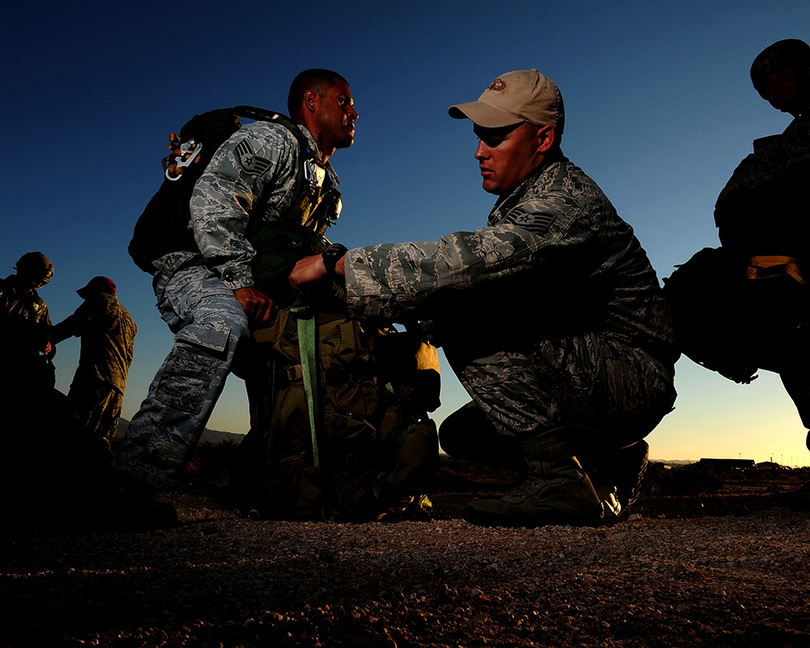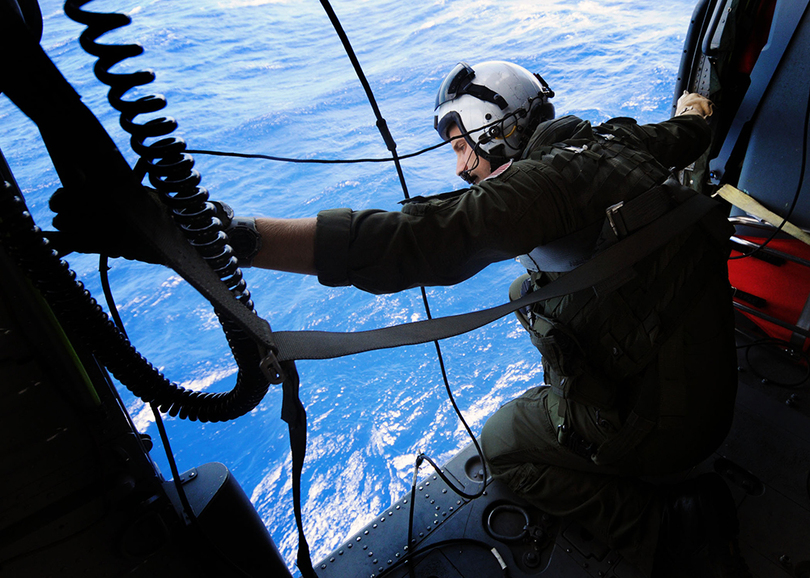SU continues to improve services, become leader in veterans affairs
Walking through the Quad was “hell” for Charles Preuss.
“I’m looking at 15 people, looking at their pockets, looking at where their hands are and I did not want to go through the Quad. I was like speed walking through the Quad because of my PTSD and anxiety and stuff,” said Preuss, a student veteran and vice president of Student Veterans of America at Syracuse University.
“In the classroom, I always had to have my eyes on the door. I ended up sitting in the front of the classes so I couldn’t see anybody in front of me because then I wouldn’t be able to pay attention to the teacher,” he said. “How would teachers know I’m a veteran unless I tell them? They don’t.”
Preuss served seven years in the United States Army and is one of 322 student veterans on the Syracuse University campus. As a student veteran, Preuss has been faced with issues relating to his time in the service, but says the resources SU offers to veterans have helped. SU has been a leader in veterans affairs since World War II and Chancellor Kent Syverud has recently called for an initiative to make SU the best school in the country for veterans.
A study conducted by Laura Steinberg, dean of the College of Engineering and Computer Science, and a Corri Zoli, director of research at the Institute for National Security and Counterterrorism, found that the biggest barrier for transitioning service members is fear.
“So you can take a young man or woman that may have spent three to five years while serving in Afghanistan and they’re more scared of coming to a college campus than they are serving in Afghanistan,” said Michael Haynie, vice chancellor for veterans and military affairs at SU.
Haynie said the wall between student veterans and non-veteran students is one that causes some of the most trouble at SU.
“It’s this whole idea of feeling like you fit in and that is the biggest barrier here at Syracuse. How do we create an environment where veterans can come here as students and feel like they’re part of the SU community?” he said.
Both Preuss and Daniel Piston, a student veteran who studies health and exercise science at SU, said that the age discrepancy between the average college student and student veterans is a problem.
“It puts you at a completely different level as to what your responsibilities are in life,” Piston said.
Serving veterans is not new for SU. Following World War II, SU Chancellor William Pearson Tolley served on the Presidential committee that drafted the original GI Bill. Tolley enacted a uniform admissions program, which ensured all military personnel were admitted to SU upon returning from war. By the end of 1947, SU ranked first in New York state and 17th in the U.S. in veteran enrollment.
But since then, SU has dropped in the rankings of veterans affairs. In September, College Factual, a website that helps prospective college students, ranked SU the 348th best school in the country for veterans, but 114th in best quality. In Syverud’s inauguration address in April, he said he wants to restore SU’s reputation as a top school for veterans.
One of Syverud’s first steps to do this was through the promotion of Haynie to the role of vice chancellor for veterans and military affairs in May. Haynie, the co-founder and executive director of the Institute for Veterans and Military Families, served 14 years in the United States Air Force and also founded the Entrepreneurship Bootcamp for Veterans with Disabilities program at SU, which educates post-9/11 veterans with disabilities in entrepreneurship and small business management.
“I think it speaks to our past, our present and our future,” Haynie said about Syverud’s commitment to improving veterans affairs. “What I appreciate about Chancellor Syverud’s commitment is it’s not ‘doing the right thing,’ it’s about doing the right thing for the institution. His commitment is about creating an opportunity for veterans to come here as students and make this institution better.”
Haynie’s tenure officially began on July 1 and he said that since his new job began, he has been able to make small steps to improve veterans affairs.
“To use a military metaphor, bureaucracies move like battleships, they do not turn on a dime. A lot of what I’ve been focused on initially is just creating the conditions required for us to be the best,” Haynie said.
Haynie said he is working to create workshops for non-veteran students, faculty and staff that are “sort of Veteran 101.” Haynie said Texas Tech University, which is the 7th best school in the country for veterans according to College Factual, has a program called the “Green Door Program.” Texas Tech held workshops similar to the ones Haynie is proposing and participants received a green door hanger after the workshop.
“What that was supposed to symbolize was, to a student veteran, on the other side of that door is somebody who gets me, somebody who I can talk to. Whether they’re a veteran doesn’t matter,” he said.
Haynie has also created a partnership with SU Athletics, in which before every home football game, a current member or veteran of the U.S. military is honored in a presentation known as “Hometown Heroes.” Haynie said “the first time we did it, to see the student body stand up and clap, that was very, very powerful.”
Haynie’s job also includes overseeing the ROTC program and he said “it’s sort of both ends of the pipeline — we have a role preparing future military leaders and also empowering those who have served.”
Lt. Col. Michael Bianchi, professor of military science at SU, said what sets the SU ROTC program apart from other programs is Syverud’s vision and added that Haynie’s promotion also benefits the ROTC program.
“Having a vice chancellor for veterans and military affairs, for us, is clearly an advantage as we try to resource the hundred or so students we have in the program,” he said. “There is a vision and we are in that vision, so that’s good.”
While Haynie continues to develop and implement his own goals, Preuss, the student vice president of SVA at SU, said Haynie has served as a sounding board for ideas because of his experience creating the IVMF and other veterans resources.
Preuss said a solution to professors being unaware of veterans in their classes is to have a “V” next to the veteran’s name on the class roster. By being aware of a veteran in the classroom, it benefits the entire class because of the experiences veterans can share, he said.
SVA is trying to build a program similar to a learning community, in which student veterans live together which will help veterans because “they’ll know what each other is talking about and strengthen that bond and connection,” Preuss said.
Going forward, Preuss said he wants SU to serve as the model for veterans affairs in higher education.
“I would like Syracuse University to be the cookie cutter,” he said. “Because I like to believe in underdogs and if you mold the underdog well enough, they will overcome things that people never would have thought. I feel like SU is on the forefront of being the cookie cutter.”
Said Preuss: “We don’t want pity. Don’t pity me, empower me.”
Published on November 11, 2014 at 12:01 am
Contact Justin: jmatting@syr.edu | @jmattingly306







